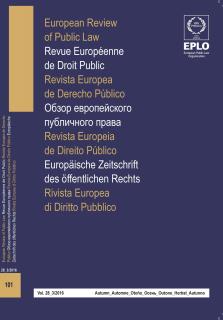
Administrative Law / Droit administratif
Austria / Autriche
Univ.-Prof. Mag. Dr. Iris Eisenberger, M.Sc. (LSE), Universität für Bodenkultur Wien
Mag. Dr. Andreas Stefan Huber, Freshfields Bruckhaus Deringer LLP
The developments of Austrian administrative law in the years 2015 and 2016 were mainly dominated by three topics: refugees, terrorist threats and the presidential election. Rising numbers of asylum seekers and new requirements by the European Union triggered several amendments to asylum and immigration laws. Transnational terrorism and cyber-attacks led to legislative activities to broaden the powers of state security. The authorities are now equipped with additional competences to gather information. The numerous mishaps during the federal presidential election led the government to revise electoral law. Particularly striking was the annulment of the second ballot by the Constitutional Court due to unlawful counting of the postal votes in several districts. Apart from these politically charged topics, several amendments were technologically triggered. Of particular importance are the first steps towards the regulation of automated driving systems. In addition, the legislator strengthened the ban on the cultivation of genetically modified organisms throughout the federal territory and liberalized the possibilities of medically assisted reproduction.
Le développement du droit administratif en Autriche entre 2015 et 2016 a été essentiellement dominé par trois thématiques: les réfugiés, la menace terroriste et les élections présidentielles. Le nombre croissant de demandeurs d’asile ainsi que celui des nouvelles prescriptions juridiques du droit de l’Union ont engendré plusieurs amendements du droit des étrangers et du droit d’asile. Le terrorisme transnational et les cyberattaques, en augmentant le niveau de menace, ont obligé le législateur à étendre les pouvoirs de protection de l’Etat policier. C’est pourquoi les autorités possèdent désormais des moyens supplémentaires de collecte d’informations. Les nombreux incidents qui se sont déroulés au cours des élections présidentielles, comme notamment le dépouillement illicite des votes postaux dans plusieurs districts, ont amené le gouvernement a réviser le droit de vote. L’annulation du second tour des élections présidentielles par la Cour constitutionnelle en est un exemple particulièrement sévère. Outre ces questions politiques explosives, plusieurs modifications législatives ont été indexées par la technologique. En effet les premières mesures pour réglementer la conduite automatisée ont été mises en place. Le législateur a également garanti l’interdiction de cultiver des organismes génétiquement modifiés dans tout le pays et a libéralisé les possibilités de la procréation médicalement assistée.
Die verwaltungsrechtlichen Entwicklungen Österreichs in den Jahren 2015 und 2016 waren vor allem durch drei Themen dominiert: Flüchtlinge, Terrorbedrohung und Bundespräsidentenwahl. Steigende Asylwerberzahlen und neue unionsrechtliche Vorgaben lösten mehrere Novellen des Fremden- und Asylrechts aus. Aufgrund der veränderten Bedrohungslage durch den transnationalen Terrorismus und Cyber-Angriffen, erweiterte der Gesetzgeber die Befugnisse des polizeilichen Staatsschutzes. Den Behörden stehen nun zusätzliche Möglichkeiten der Informationsgewinnung offen. Die zahlreichen Pannen während der Bundespräsidentenwahl, veranlassten die Politik sich verstärkt mit dem Wahlrecht auseinanderzusetzen. Besonders einschneidend war die Aufhebung der Bundespräsidenten-Stichwahl durch den Verfassungsgerichtshof. Grund war die rechtswidrige Auszählung der Briefwahlstimmen in mehreren Bezirken. Abseits dieser politisch brisanten Themen, gab es mehrere technologisch indizierte Gesetzesnovellen. Hervorzuheben sind die ersten Schritte zur Regulierung des automatisierten Fahrens. Ferner sicherte der Gesetzgeber das Anbauverbot von gentechnisch veränderten Organismen im gesamten Bundesgebiet ab und liberalisierte die Möglichkeiten der medizinisch unterstützten Fortpflanzung.
* Wir danken Thomas Buocz und Lisa Müllner für die Unterstützung bei der Recherche und der Ergänzung des Fußnotenapparats.





















